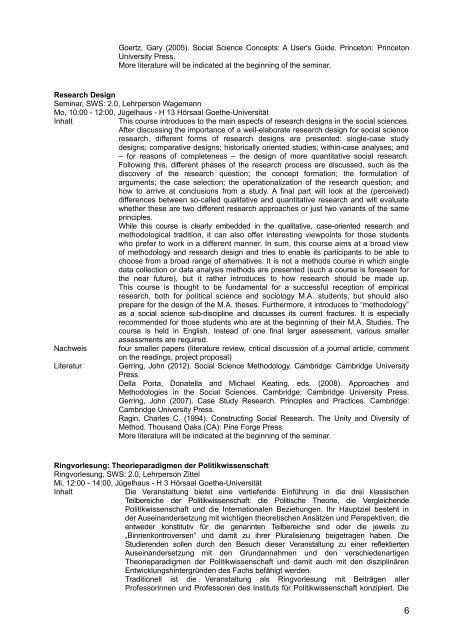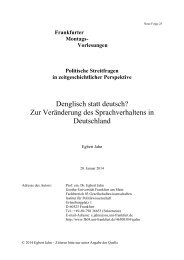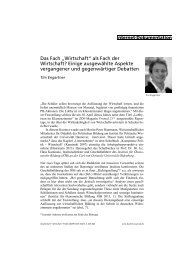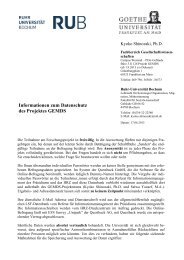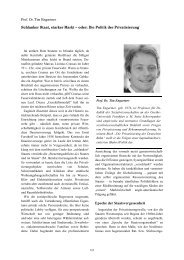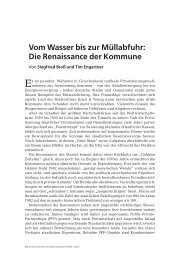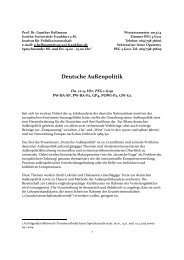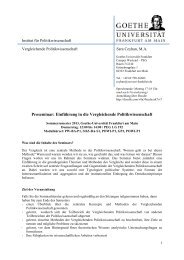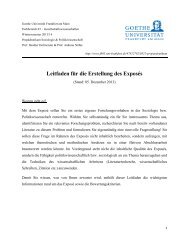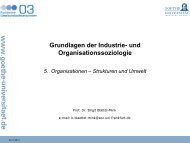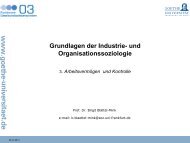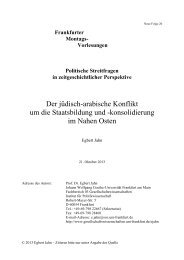Komm. Vorlesungsverzeichnis M.A. ISFK WS 2012/13 - Goethe ...
Komm. Vorlesungsverzeichnis M.A. ISFK WS 2012/13 - Goethe ...
Komm. Vorlesungsverzeichnis M.A. ISFK WS 2012/13 - Goethe ...
Sie wollen auch ein ePaper? Erhöhen Sie die Reichweite Ihrer Titel.
YUMPU macht aus Druck-PDFs automatisch weboptimierte ePaper, die Google liebt.
Goertz, Gary (2005). Social Science Concepts: A User's Guide. Princeton: Princeton<br />
University Press.<br />
More literature will be indicated at the beginning of the seminar.<br />
Research Design<br />
Seminar, S<strong>WS</strong>: 2.0, Lehrperson Wagemann<br />
Mo, 10:00 - 12:00, Jügelhaus - H <strong>13</strong> Hörsaal <strong>Goethe</strong>-Universität<br />
Inhalt This course introduces to the main aspects of research designs in the social sciences.<br />
After discussing the importance of a well-elaborate research design for social science<br />
research, different forms of research designs are presented: single-case study<br />
designs; comparative designs; historically oriented studies; within-case analyses; and<br />
– for reasons of completeness – the design of more quantitative social research.<br />
Following this, different phases of the research process are discussed, such as the<br />
discovery of the research question; the concept formation; the formulation of<br />
arguments; the case selection; the operationalization of the research question; and<br />
how to arrive at conclusions from a study. A final part will look at the (perceived)<br />
differences between so-called qualitative and quantitative research and will evaluate<br />
whether these are two different research approaches or just two variants of the same<br />
principles.<br />
While this course is clearly embedded in the qualitative, case-oriented research and<br />
methodological tradition, it can also offer interesting viewpoints for those students<br />
who prefer to work in a different manner. In sum, this course aims at a broad view<br />
of methodology and research design and tries to enable its participants to be able to<br />
choose from a broad range of alternatives. It is not a methods course in which single<br />
data collection or data analysis methods are presented (such a course is foreseen for<br />
the near future), but it rather introduces to how research should be made up.<br />
This course is thought to be fundamental for a successful reception of empirical<br />
research, both for political science and sociology M.A. students, but should also<br />
prepare for the design of the M.A. theses. Furthermore, it introduces to “methodology”<br />
as a social science sub-discipline and discusses its current fractures. It is especially<br />
recommended for those students who are at the beginning of their M.A. Studies. The<br />
course is held in English. Instead of one final larger assessment, various smaller<br />
assessments are required.<br />
Nachweis four smaller papers (literature review, critical discussion of a journal article, comment<br />
on the readings, project proposal)<br />
Literatur Gerring, John (<strong>2012</strong>). Social Science Methodology. Cambridge: Cambridge University<br />
Press.<br />
Della Porta, Donatella and Michael Keating, eds. (2008). Approaches and<br />
Methodologies in the Social Sciences. Cambridge: Cambridge University Press.<br />
Gerring, John (2007). Case Study Research. Principles and Practices. Cambridge:<br />
Cambridge University Press.<br />
Ragin, Charles C. (1994). Constructing Social Research. The Unity and Diversity of<br />
Method. Thousand Oaks (CA): Pine Forge Press.<br />
More literature will be indicated at the beginning of the seminar.<br />
Ringvorlesung: Theorieparadigmen der Politikwissenschaft<br />
Ringvorlesung, S<strong>WS</strong>: 2.0, Lehrperson Zittel<br />
Mi, 12:00 - 14:00, Jügelhaus - H 3 Hörsaal <strong>Goethe</strong>-Universität<br />
Inhalt Die Veranstaltung bietet eine vertiefende Einführung in die drei klassischen<br />
Teilbereiche der Politikwissenschaft: die Politische Theorie, die Vergleichende<br />
Politikwissenschaft und die Internationalen Beziehungen. Ihr Hauptziel besteht in<br />
der Auseinandersetzung mit wichtigen theoretischen Ansätzen und Perspektiven, die<br />
entweder konstitutiv für die genannten Teilbereiche sind oder die jeweils zu<br />
„Binnenkontroversen“ und damit zu ihrer Pluralisierung beigetragen haben. Die<br />
Studierenden sollen durch den Besuch dieser Veranstaltung zu einer reflektierten<br />
Auseinandersetzung mit den Grundannahmen und den verschiedenartigen<br />
Theorieparadigmen der Politikwissenschaft und damit auch mit den disziplinären<br />
Entwicklungshintergründen des Fachs befähigt werden.<br />
Traditionell ist die Veranstaltung als Ringvorlesung mit Beiträgen aller<br />
Professorinnen und Professoren des Instituts für Politikwissenschaft konzipiert. Die<br />
6


